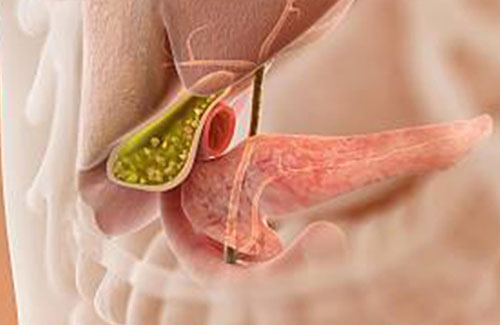Do you have pain in upper abdomen, burning sensation, bloating and discomfort is a regular feature? Symptoms aggravate after eating meals especially fried or fatty meals? Is your ultrasound showing gall bladder stones? Has your surgeon suggested you an elective cholecystectomy (Removal of gall bladder) before it blocks the duct and turn into an emergency? And you are seriously considering the surgery to be relieved of the symptoms which are causing a problem in your daily life? Then this article is going to help you to understand, if there is a scope of avoiding the surgery?
Let’s say you opted for surgery but even after surgery your bloating is going away or it is going worse now you feel more bloated and more gas in your stomach?
Will you ask your surgeon to put gall bladder back? No, we know that is not option now.

Gall bladder is a pear-shaped pouch located under the rib cage below the Liver. Its main function is to store the bile secreted by the liver and release in a phased manner in the duodenum depending upon the amount of fat in our meals. The function of bile is to emulsify(dissolve) the fat into the intestine to make it absorbable. If you eat too fatty especially saturated fat in your diet your gall bladder will release more bile and less fat means less bile. But due to imbalance food and lifestyle this bile tends to coagulate and harden to make gall stones which may be pigment stones or calcium stones depends on the kind of diet you are taking. Or there can be infection or inflammation acute or chronic which is causing the problem.
If that stone will come in the main duct and block the bile passage your gall bladder may swell up and become inflamed leading to condition like acute cholecystitis or pancreatitis which needs a surgery. But this condition happens one in a thousand patients in most of the patients it is a chronic problem which may be recovered given the proper attention to what we eat?

What are the main reasons for gallstones or gall bladder infection. Here are a few of them mentioned below.
According to most of the research done in the field it is understood that surgery should be the last resort to the problem. Earlier it was believed that gall bladder is not an essential organ and life can be dispensed without it also. So elective surgery is a better option before things go out of hand. But as our understanding deepens and more research went into the subjects it is now understood that no tissue in the body is useless and we should try to save it as far as possible until this becomes a life-threatening option one should not go for gall bladder surgery.
What happens in the intestine is when we eat too much fat in our meals the liver secrets more bile which eventually come to the gall bladder and from here to the intestine to emulsify the fat. As fats gets emulsified it gets absorbed into the blood and goes to the liver for further digestion to happen. Whatever the bile is used to emulsify the fat is also reabsorbed into the blood along with fat and goes back to the liver which is giving double the load on liver. Now you have loaded the liver with extra burden. The solution is far simpler than it seems. Solution lies in the proper disposal of the bile. And how does that happen? The fibre is the biggest cleaner of the bile.
The fibre in our food just clings to the bile and does allow it to reabsorbed into the blood. So, it just cleans out the gallbladder and reduces the load on it? All that you have to do is calculate the right amount of fats, carbohydrate and proteins along with fibre and fluid intake and micronutrients like amount of vitamin B12 and Folic acid. Soon you may find out the problem was not with that innocent gall bladder but with imbalanced food that you were eating.
